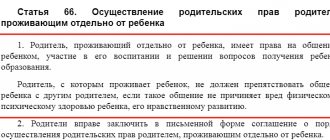65
Often after a divorce, the conflict between former spouses with children reaches such an acute stage that the mother decides to limit the father’s communication with the child. Alas, this is not so easy to do. Since the parent who left the family retains all rights and obligations towards the child, regardless of the circumstances of separation and divorce. With the exception of situations where communication could harm a minor. Let's look at how to legally limit a father's communication with a child after a divorce.
It is impossible to simply take and not allow the father to approach the child based on the mother’s sole desire, just as it is impossible to deprive him of parental rights without compelling reasons directly listed in the law.
Expert opinion
Stanislav Evseev
Lawyer. Experience 12 years. Specialization: civil, family, inheritance law.
Often, a mother’s attempts to limit communication with her baby are caused by a hostile attitude towards his father. But what if the father negatively influences the child, turns him against his own mother and uses him as a tool to settle scores with his ex-wife? After all, a child can live with his mother following a court decision, but after being “processed” by his father and upon reaching the age of 10, begin to insist on living with his father, which does not always have a positive effect on the child’s future life.
Reasons for limiting communication
The law does not provide a specific list of grounds for limiting a father’s communication with his child. However, courts are often guided by a list of grounds for depriving or limiting parents of their rights.
These grounds are spelled out in Art. 69 RF IC and include:
- malicious failure to pay alimony, subject to prosecution for such;
- other evasion of parental responsibilities for raising and maintaining a child;
- refusal to pick up a child from educational, medical and other institutions where he is staying;
- violence against a child (including mental), as well as the commission of a crime against their child by a parent;
- alcoholism or drug addiction of a parent.
These grounds can become an absolute reason for depriving an unscrupulous father of parental rights, not to mention restricting communication with the child or limiting his rights.
However, such reasons may not always exist. The child’s father can be a completely positive person, work, have no criminal record, pay child support, but the child’s communication with him can negatively affect the child’s development as a whole.
The grounds listed below are not specified in the law. But they are accepted by the courts as grounds for limiting communication between a father and a child when determining the appropriate procedure for raising children after a divorce:
- a bad influence on a child, expressed in unhealthy hobbies, cultivation of cruel or immoral behavior, etc.
- negative influence of the father on the studies and development of the minor;
- negative assessments of the father towards the mother, imposing his opinion in this regard;
- refusal to take into account the interests of the mother, repeated removal of the child and his retention without informing the mother of his whereabouts.
Example. After divorcing his wife, Ivanov regularly took his 11-year-old son K. to his place for the weekend. After staying with his father, the child behaved aggressively towards his mother, accused her of ruining the relationship, repeatedly ran away from home and began skipping school. The child’s mother found out that the father regularly tells him false information about her, about her non-existent infidelities, and convinces him to spend more time with him, even to the point of damaging his education. He convinces him that education is not needed, since he will leave part of the business to his son. Formally, the actions of the father are not grounds for restriction of parental rights, however, the court can, at the request of the mother, establish a procedure for communication with the child, limiting Ivanov’s free communication with his son.
All these grounds are subject to establishment by the court and, most often, with the involvement of experts through the appointment of a forensic psychological examination.
Can a father sue a child?
In most cases, children live with their ex-wife after a divorce. To deprive her of maternal rights, the man provides evidence:
- lack of participation in the upbringing and care of the child;
- violent behavior towards a minor;
- forcing children to beg, drink alcohol or use drugs;
- the ex-wife has alcohol, drug addiction or mental disorders;
- the mother commits an offense against the children.
Important! The court makes a decision based on the financial situation of the parties. If the mother is a university student, lives with her parents, and does not work full-time, the child will not be given to the father.
The presence of legal circumstances limiting communication between an ex-husband and a child does not give a woman the right to ignore the requests of the other party. If she cannot justify the ban or ignores the order of the guardianship authorities, the man files a lawsuit. Further meetings take place according to the regulations established by representatives of the executive branch.
Read also: Is it possible to get a divorce if your wife is pregnant?
Restriction through establishing a procedure for communicating with the child
Restriction of free communication with a child through the court is possible within the framework of cases on establishing the procedure for communication with a child. Such measures are the mildest impact on the child’s father, which does not violate his rights as a parent and protects the child from the negative impact of a parent who wants to settle scores with his ex-wife.
In a claim to establish a procedure for communicating with a child, the child’s mother may demand to determine:
- time and place of communication between the father and the child (for example, every Friday or Saturday at her home);
- conditions and circumstances of communication between father and child (strictly in the presence of mother, grandmother, and other persons);
- the duration of such communication (set in both hours and days);
- frequency and maximum number of meetings;
- other conditions that are important for the child and parents.
Important! The child’s father can also bring the same claim or counterclaim if he does not agree with the mother’s opinion. Claims are subject to consolidation and are considered within one case.
Where to contact
Cases regarding disputes related to the upbringing of children fall under the jurisdiction of district and city courts. The claim must be filed at the place of residence of the defendant.
Also, such a demand can be filed when filing a claim for divorce, but lawyers recommend separating these two categories of cases and not combining the demand unless absolutely necessary.
Statement of claim
The claim must be prepared according to the rules listed in Art. 131-132 Code of Civil Procedure of the Russian Federation. Strict compliance with these requirements is necessary, otherwise the claim will be left without progress, and then completely returned back to the applicant if the shortcomings are not eliminated.
The statement of claim must indicate:
- full name of the court and its actual address;
- Full names of the parties, their registration addresses and actual location;
- name and address of the third party in the case;
- circumstances of the case: date and reasons for divorce; reasons for the child’s residence with the mother; reasons for the conflict with the child’s father, etc.
- justification for the need to establish a procedure for communication and restrictions on the father’s communication with the baby;
- evidence and references to legislation;
- a request addressed to the court;
- date, signature;
- list of attached documents.
When considering such cases, the guardianship and trusteeship authority must be involved, which carefully monitors the interests of the minor child. You can indicate the local guardianship authority immediately in the claim, but its absence will not be a mistake - the court itself will involve the guardianship authority in participating in the case.
The statement of claim is submitted personally by the plaintiff or sent by post with mandatory notification of delivery.
Expert opinion
Stanislav Evseev
Lawyer. Experience 12 years. Specialization: civil, family, inheritance law.
The presented sample is formal in nature and reflects only one of hundreds of possible situations. When drafting a statement of claim, it is strongly recommended that you consult with an experienced lawyer. Our portal’s specialists will help you draft the document and provide legal advice completely free of charge upon your request.
Important! If the opinion of other persons is required, they must be indicated in the claim as witnesses by filing a corresponding petition.
Documentation
The claim will need to be accompanied by:
- copies of claims by number of parties;
- documents about marriage, divorce, child (copies of certificates);
- a copy of the plaintiff's passport;
- evidence of the stated arguments: certificates, extracts, characteristics.
All documents (except for certificates) are provided in copies. You must take the originals with you during the process.
The plaintiff is exempt from paying the fee since the claim is filed in defense of a minor child. If the claim is satisfied, a fee of 300 rubles will be collected from the defendant, but if the claim is denied, the plaintiff will have to pay the costs.
Process and Procedure
The hearing of the case on restriction of communication with the child takes place in the presence of the plaintiff. The defendant and the guardianship and trusteeship authority.
The parties may request a hearing in their absence, but this makes it much more difficult for them to exercise their right to defense.
Important! A child who has reached the age of 10 must be invited to the process so that his opinion is taken into account. The interview of the minor takes place in the presence of a teacher.
During the consideration of the case, all circumstances are established that directly or indirectly indicate that the child’s communication with his father is harmful to his health or development.
Besides:
- documents are examined;
- requests are made;
- witnesses are being questioned.
The guardianship and trusteeship authority, at the request of the court, is obliged to provide its opinion on this issue, as well as an inspection report of living conditions both at the place of residence of the father and at the place of residence of the mother, if the issue is being decided whether the second parent can take the child with him or her No.
If it is impossible to clearly establish the influence of the father on the child, a forensic psychological examination will be required.
Important! If a compromise is reached, the parties can enter into a settlement agreement by submitting to the court for approval a procedure drawn up and agreed upon by them for communication with the child, which suits both parties.
Expertise
Since none of the participants in the process has the special knowledge to give an unambiguous answer about whether certain actions or words of the father are harmful to the development of the child, such questions are submitted to the permission of an expert.
The parties have the right to file a petition for a forensic psychological examination, but in the absence of one, the court independently appoints an examination.
During the expert study, the following questions may be asked:
- To which parent does the child feel the most affection?
- Does the child's father form a negative opinion of the child about his mother?
- whether certain actions of the father are dangerous for the psychological and other development of the child.
These are just sample questions that could be posed to an expert. The exact list of issues is established by the court with the participation of the parties and guardianship authorities.
The result of the expert research will be the key evidence in the case and will be the basis for the court decision.
Father's rights to a child before and after divorce
In 90% of cases, after the divorce of a marriage, the rights to raise children remain with the mother. This does not reduce the equality of men's rights. A woman’s biased attitude towards her ex-husband should not affect his ability to see the child they share together.
After the annulment of the marriage, the father has the right to:
- regular meetings with children even with mother’s prohibitions;
- changing the surname of the offspring if they had their mother’s maiden name;
- information about the health, place of residence, and financial condition of children;
- joint vacation with a child in the Russian Federation or abroad;
- resolving the issue of the mother’s obstacles to a joint vacation through the court.
Important! In the absence of restrictions on communication, a man can give gifts to children, travel with them, or demand that the mother pay attention to the upbringing and education of the children.
Arguments that will help leave the child with the father
If not divorced
Most citizens believe that mom will take better care of the children than dad. And most fathers are not ready to take responsibility for the upbringing and guardianship of a child. There are also fathers whose communication poses a threat to the mental and physical health of the baby.
But those fathers who want to take part in raising a child, are ready to spend their time and money on their children, but who are prevented from meeting the child by their mother, should know what rights the father has and how to defend them.
Parents can independently agree and even draw up a schedule for visiting the father. But situations often arise when the mother, in violation of the RF IC, prohibits the father from seeing the baby even if the spouses are not divorced, but are temporarily living separately. Mothers justify such restrictions by the fact that the father gives little money to support the baby or by the desire to find a new father for the child.
Such a restriction of the father’s rights is obviously illegal and violates not only the rights of the man, but also the rights of the child.
Where to contact
In such a situation, the father has the right to contact the guardianship authorities at the child’s place of registration or the court. The application to the guardianship authorities is drawn up in free form.
It should contain the following information:
- personal data (full name, residential address of spouses and child);
- date of marriage registration (if the marriage took place);
- date of birth of the baby;
- statement of factual circumstances. The fact that you do not live temporarily, support the children financially, the spouse prohibits meeting with the children;
- please take action with the mother and establish a schedule for visiting the children;
- applicant's signature.
Important! When contacting the guardianship authorities, you should refer to the following articles of the RF IC: 61 (equal rights of parents in raising children), 66 (the right to participate in the raising of children of a parent living separately).
If the spouses did not file for divorce, but the father lives separately, and the mother restricts his rights to see the baby, the father has the right to apply to the court to protect his rights.
To do this, a statement of claim is filed to determine the place of residence and the order of communication with the child. But in practice, the number of such claims filed within a marriage is minimal - all litigation begins between spouses during or after a divorce.
Responsibility for violation of a court decision by the mother
If the mother refuses to comply with the court decision, the father can bring her to justice. To do this, it is necessary to record the fact of violation.
The father must, in the presence of the bailiff, ask for the child to be picked up according to the schedule. If a woman refuses, then a protocol is drawn up under Art. 5.35 Code of Administrative Offences.
The fine for the first violation ranges from 2,000 to 3,000 rubles. For a repeat – from 4,000 to 5,000 rubles. or arrest for up to 5 years.
A repeated violation is one committed within 12 months of the first.
Example. During the divorce, the couple decided that their three-year-old son would live with his mother. The father regularly pays child support as ordered by the court. She picks up her child from kindergarten on Friday, spends the weekend with him, and goes to the sea in the summer. However, three years later, the ex-wife decides to stop such communication, demanding a large amount from the father to support his son. It was not possible to come to an agreement with the mother.
The father filed a lawsuit to establish a schedule of visits with his son. The problem was that my father’s work involved business trips, and from time to time he was not home for several days. However, the court supported the father’s demands, and a decision was made to establish the days for the father to meet with his son.
As a protest, the mother completely stopped communication between her ex-husband and her son. The father was forced to re-write a statement to the court. With the help of a lawyer, it was possible to organize the forced execution of a court decision and bring the ex-wife to justice for obstructing the execution of the court decision.






